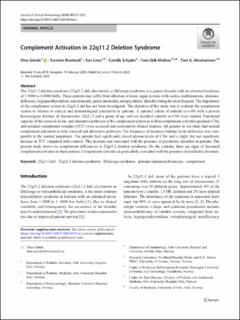| dc.contributor.author | Grinde, Dina | |
| dc.contributor.author | Øverland, Torstein | |
| dc.contributor.author | Lima, Kari | |
| dc.contributor.author | Schjalm, Camilla | |
| dc.contributor.author | Mollnes, Tom Eirik | |
| dc.contributor.author | Abrahamsen, Tore G | |
| dc.date.accessioned | 2021-02-12T09:19:38Z | |
| dc.date.available | 2021-02-12T09:19:38Z | |
| dc.date.created | 2021-02-05T15:49:51Z | |
| dc.date.issued | 2020 | |
| dc.identifier.citation | Journal of Clinical Immunology. 2020, 40 515-523. | en_US |
| dc.identifier.issn | 0271-9142 | |
| dc.identifier.uri | https://hdl.handle.net/11250/2727621 | |
| dc.description.abstract | The 22q11.2 deletion syndrome (22q11.2 del), also known as DiGeorge syndrome, is a genetic disorder with an estimated incidence of 1:3000 to 1:6000 births. These patients may suffer from affection of many organ systems with cardiac malformations, immunodeficiency, hypoparathyroidism, autoimmunity, palate anomalies, and psychiatric disorders being the most frequent. The importance of the complement system in 22q11.2 del has not been investigated. The objective of this study was to evaluate the complement system in relation to clinical and immunological parameters in patients. A national cohort of patients (n = 69) with a proven heterozygous deletion of chromosome 22q11.2 and a group of age and sex matched controls (n = 56) were studied. Functional capacity of the classical, lectin, and alternative pathways of the complement system as well as complement activation products C3bc and terminal complement complex (TCC) were accessed and correlated to clinical features. All patients in our study had normal complement activation in both classical and alternative pathways. The frequency of mannose-binding lectin deficiency was comparable to the normal population. The patients had significantly raised plasma levels of C3bc and a slight, but not significant, increase in TCC compared with controls. This increase was associated with the presence of psychiatric disorders in patients. The present study shows no complement deficiencies in 22q11.2 deletion syndrome. On the contrary, there are signs of increased complement activation in these patients. Complement activation is particularly associated with the presence of psychiatric disorders. | en_US |
| dc.language.iso | eng | en_US |
| dc.publisher | Springer | en_US |
| dc.rights | Navngivelse 4.0 Internasjonal | * |
| dc.rights.uri | http://creativecommons.org/licenses/by/4.0/deed.no | * |
| dc.title | Complement Activation in 22q11.2 Deletion Syndrome | en_US |
| dc.type | Peer reviewed | en_US |
| dc.type | Journal article | en_US |
| dc.description.version | publishedVersion | en_US |
| dc.source.pagenumber | 515-523 | en_US |
| dc.source.volume | 40 | en_US |
| dc.source.journal | Journal of Clinical Immunology | en_US |
| dc.identifier.doi | 10.1007/s10875-020-00766-x | |
| dc.identifier.cristin | 1887176 | |
| dc.relation.project | Norges forskningsråd: 223255 | en_US |
| dc.description.localcode | This article is licensed under a Creative Commons Attribution 4.0 International License, which permits use, sharing, adaptation, distribution and reproduction in any medium or format, as long as you give appropriate credit to the original author(s) and the source, provide a link to the Creative Commons licence, and indicate if changes were made. The images or other third party material in this article are included in the article's Creative Commons licence, unless indicated otherwise in a credit line to the material. If material is not included in the article's Creative Commons licence and your intended use is not permitted by statutory regulation or exceeds the permitted use, you will need to obtain permission directly from the copyright holder. To view a copy of this licence, visit http://creativecommons.org/licenses/by/4.0/. | en_US |
| cristin.ispublished | true | |
| cristin.fulltext | original | |
| cristin.qualitycode | 1 | |

